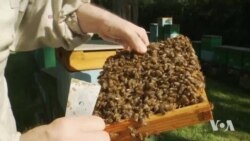Honeybees are in danger worldwide.
Their homes -- known as “colonies” -- are suffering from what scientists call Colony Collapse Disorder.
Scientists have linked the disorder to infections from harmful microorganisms and pesticides -- products meant to kill other insects.
Researchers also have blamed a sharp drop in the honeybee population to loss of the bees’ natural habitat.
Polish researchers are working on ways to save honeybees. One of the diseases that affect honeybee colonies in Poland is nosemosis, also called nosema. It is a common fungi-based disease that affects adult bees.
Aneta Ptaszynska is a researcher with Maria Curie-Sklodowska University.
“Infected worker bees live for a very short time in the summer, about eight to 12 days, while they normally live 36 days. So the productivity of the whole bee family decreases and bees also have problems with passing (the) winter...”
Scientists believe some pesticides weaken the bees’ natural resistance against disease. This makes it difficult for them to fight parasitic organisms. After eating food or drinking water containing pesticides, the bees begin to act strangely and soon die.
Scientists believe nosema is one of the main reasons the number of bees has dropped by 50 percent in Poland over the past 15 years.
Polish scientists say they have found a natural substance in flowers that is more than 90 percent effective in saving bees. They have created a drug from it. The drug is now being tested.
Scientists are warning that insecticides designed to kill mosquitoes carrying the Zika virus can also harm bees. They say such products should be used in affected areas only when it is dark -- after bees are asleep. And they say only chemicals that kill the mosquito larvae should be used.
Michael Steinkampf is a beekeeper.
“This particular strain is very toxic to mosquito larva but when it’s put in the water it doesn’t hurt the bees at all.”
I’m Christopher Jones-Cruise.
VOA's George Putic reported this story from Washington. Christopher Jones-Cruise adapted the report for Learning English. George Grow was the editor.
We want to hear from you. Write to us in the Comments Section, or visit our Facebook page.
________________________________________________________________
Words in This Story
pesticide – n. a chemical that is used to kill animals or insects that damage plants or crops
habitat – n. the place or type of place where a plant or animal naturally or normally lives or grows
fungus – n. any one of a group of related plants (such as molds, mushrooms, or yeasts) that have no flowers and that live on dead or decaying things (singular of fungi)
parasite – n. an animal or plant that lives in or on another animal or plant and gets food or protection from it
insecticide – n. a chemical substance that is used to kill insects
larva – n. a very young form of an insect that looks like a worm
strain – n. a kind or sort of something (usually + of)
toxic – adj. containing poisonous substances





